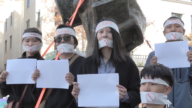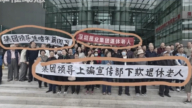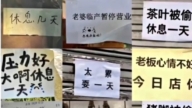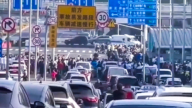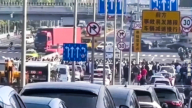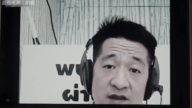【新唐人2012年12月01日訊】當您與好友在網絡上輕鬆完成對話時,你們的聊天內容可能已經暴露在中共監視人員的面前了。中國互聯網產品普遍存在配合當局主動審查的情況。新興的網路社交工具「微信」,日前也被爆出存在向當局提供內容的嫌疑。
今年9月,騰訊公司公布的「微信」註冊用戶數量已經達到兩億,不少大陸網民的手機中都會安裝「微信」軟件。因為它的方便快捷,尤其語音簡訊和圖片傳輸便利,「微信」用戶數量正持續增多。
不過,北京人權活動家胡佳日前向《新唐人》表示,他與好友通過「微信」的對話,曾被當局監控人員準確的引用。
北京人權活動家胡佳:「我發現我的朋友在受到國保的『喝茶』或訊問的時候,國保所提及的話語是來自『微信』的。而且這個話語我們只是在『微信』中交流過,還是剛剛交流不久的。這一下子就提醒了我,原來『微信』不過就是另一種短信而已。它所能達到的監控效率、迅捷程度,已經和我們打電話、發短信一樣了。」
今年下半年開始,「微信」產品逐漸擴展海外市場,許多東南亞國家也都陸續開始使用,在香港和台灣也有不少廣告宣傳「微信」。
胡佳:「香港、台灣也在使用。我告訴你,如果台灣的公職人員,或香港民主派的人使用『微信』的話,你就是坦坦然然把你的生活側影都給了中共的情報機構。」
實際上,騰訊產品配合當局審查並非首次,騰訊公司的「開山」軟體QQ,曾被多次證實存在侵犯用戶隱私的情況。騰訊也被「微軟」和「360安全公司」發現,產品客戶端存在掃瞄用戶後臺的行為。
胡佳:「像騰訊這樣的公司,早就已經跟(中共)體制結合的很緊密了。它不這麼做,就無法發展壯大,成為像現在『巨無霸』這樣一個企業。它可以從QQ裡面鎖定你的IP地址,鎖定你們之間QQ群交流的維權信息。還有從QQ信箱裡邊無障礙的提供你和其他人商議的過程。『微信』又是騰訊開發的,所以它跟QQ,被政府監控的便利程度是沒有任何差別的。」
網路技術專家立裡告訴《自由亞洲電臺》記者,對於即時消息服務,特別是大陸的,都是被當局存檔很久,並被監控的。即使發信者很快就把所發內容自行刪除,服務器上仍然有保留內容。
那麼,使用甚麼樣的通訊工具才比較安全呢?
網友劉女士認為,在中國用甚麼都不安全。不僅手機不安全,各大微博都不安全。而根本原因就在於老百姓沒有選票,沒有政治權力,所以任何權利都得不到伸張。
網友劉女士:「新浪微博我說就是『殭屍』微博,要麼就不允許轉發別人帖子,要麼就無法轉換網頁,要麼就根本無法登陸,不斷的要驗證碼,驗證碼對了也不給你進。其實不安全不在於我們,我們心裡很坦然、也很平和,是當局害怕,它害怕甚麼呢?」
胡佳語帶感嘆的說,在如今的中國,民眾並非因為做了甚麼虧心事,或觸犯法律而受到打壓,是當局把民眾的基本權利視作洪水猛獸。大家沒有甚麼不可告人的秘密,只是不想在做任何合法的事情之前,都要受到中共的非法侵害和阻撓,所以才要採取保護自己信息安全的措施。
採訪/朱智善 編輯/王子琦 後製/王明宇
Internet Social “Micro-Channel" becomes a National Protected Treasure?
When you and your friends relaxedly complete
your conversation on the Internet, the content of your chat
may have been exposed in front of the Chinese Communist
Party (CCP) surveillance team.
The Chinese Internet product companies normally cooperate
with authorities to facilitate active reviewing.
An emerging social network tool, micro-channel,
has become a suspect in this type of activity.
Last September, Tencent announced its registered
micro-channel users have reached two hundred million.
Many Mainland netizens have micro-channel software
on their cell phones.
It is quick and easy to use, especially voice SMS and picture
transmission facilities.
The number of micro-channel users is continuing to increase.
However, Beijing human rights activist, Hu Jia, told NTDTV
that his dialogue with a good friend through micro-channel had been accurately quoted by surveillance personnel.
Hu Jia: “I found when my friends were cross-examined
by National Security personnel, they mentioned words from my recent dialogue on the micro-channel.
This reminded me that micro-channel’s monitoring efficiency
is as quick as phone calls and text messages.
In the second half of this year, micro-channel products
gradually expanded to overseas markets.
Many Southeast Asian countries began to use it for advertising,
including Hong Kong and Taiwan.
Hu Jia: “People in Hong Kong and Taiwan are also using it.
I tell you, if Taiwan public officials or the people
of the democratic movement in Hong Kong
use the micro-channel, they are giving their life profile
to the intelligence agencies of the CCP.
In fact, Tencent has cooperated with the CCP before.
It is repeatedly confirmed that tencent’s software,
QQ, has violated user privacy.
Tencent also found products from “Microsoft"
and “360 security company” that exhibit behavior of scanning users’ background.
Hu Jia: “Tencent has cooperated with the CCP very closely,
otherwise it could not have grown and developed into a giant.
It can capture your IP address from its QQ
and your group exchanges.
It can also provide the content of your conversation to others.
Since micro-channel is developed by Tencent, it is convenient
for the government to use just like other Tencent products.”
Internet technical experts Li Li told Radio Free Asia,
“regarding instant messaging services, reporters, particularly to Mainland, have been archived and monitored for a long time.
Even if someone quickly deletes their content, it will be kept
on the server.
So, what are safer communication tools?”
Netizen Ms. Liu believes that nothing, including cell phones
and the many micro loggings, is safe in China.
The fundamental reason is that the people cannot vote
and have no political power, so their rights are not protected.
User Ms. Liu: “I said Sina micro blogging is a ‘zombie’.
It either stops you from forwarding others posts
or from changing to other websites.
It requires you to validate a verification code repeatedly.
Even after you have done it, it still refuses to let you in.
In actuality, fear is not within us, it is within the authorities.
We are calm and peaceful, but they are afraid.
What are they so afraid of?”
Hu Jia laments that in today’s China, people are being
suppressed not because they have done something wrong
or violate the law, but because the authorities are so afraid
of people’s basic rights.
No one wants to do something sinister.
However, people want to prevent illegal infringement
and obstruction from the authorities, so they have a need
to take measures to protect the security of their own
information.



